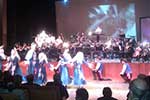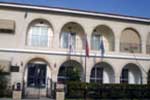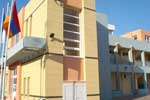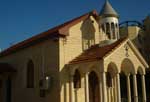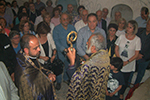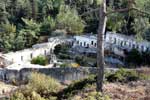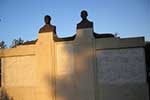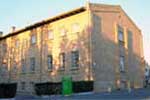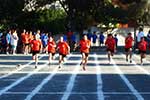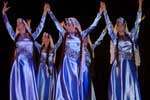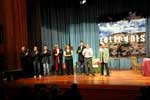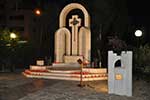Sassounian Column

Conference Participants Enthusiastically Support Elective Diaspora Leadership
After much anticipation and lengthy preparations, the Institute of Armenian Studies at the University of Southern California (USC) held on November 20 a successful international symposium -- "The Armenian Diaspora: Elective Leadership and Worldwide Structure."
The symposium was attended by 600 enthusiastic participants from throughout the United States, Canada, Russia, Australia, and Europe. The speakers were: Dr. Z.S. Andrew Demirdjian, Cal State University, Long Beach, "The Persuasive Power of Numbers: A Call for Political Clout"; Dr. Archalus Tcheknavorian-Asenbauer, Senior UN Advisor, Vienna, "Armenian Unity and International Politics"; Harut Sassounian, Publisher, The California Courier, "Proposal for a Popularly Elected Structure to Represent Diaspora Armenians"; Dr. Gaidz Minassian, Foundation for Strategic Research, Paris, "Toward a World Council of Armenians: Why, How, Who?"; Gov. George Deukmejian, "Personal Reflections of California's First Armenian Governor"; Honorable Grigor Hovhannissian, Consul General of Armenia, Los Angeles, "Welcoming Remarks"; former U.S. Ambassador to Armenia John Evans, "Maximizing Influence in a World of Nation-States: A Challenge for the Armenian Diaspora"; journalist/author Mark Arax, Fresno, "The Power of Speaking to the Media with One Collective Voice"; Dr. Levon Marashlian, Glendale Community College, "The Necessity and Difficulty of Establishing a Diaspora Congress"; Dr. Stephan Astourian, Univ. of California, Berkeley, "The Traditional Armenian Parties and the Problem of Pan-Armenian Coordination"; Dr. R. Hrair Dekmejian, USC and Dr. Nyree Derderian, Stanford University, "Models and Modalities of Creating a Trans-Diaspora Framework," followed by a round table discussion between the speakers and the audience.
My own remarks were an expanded version of the article I wrote nine months ago, proposing the creation of a democratically-elected structure that would represent all Armenians in the Diaspora.
I stated that a growing number of Armenians have realized that a collective effort is necessary if they are to survive as a dispersed ethnicity detached from its homeland. Beyond the need to preserve the Diaspora's vibrancy and cultural identity, Armenians share a common quest for justice from Turkey and a firm commitment for the security and economic prosperity of the twin Republics of Armenia and Artsakh. Armenians have finally concluded that they can benefit immensely from pooling their limited resources and jointly tackling common problems facing all Diaspora communities.
As outlined in my February article, I elaborated about the framework of establishing an elected body that would legitimately represent Armenians throughout the Diaspora, except those in Armenia and Artsakh, who already reside in state structures with elected governments. Thus, for the first time in Diaspora's history, Armenians would elect their own representatives or leaders, on the basis of one-man, one vote.
I also suggested that elections be held by Armenian communities to choose one representative for each group of 20,000 Armenians. The collective body of 350 representatives from all electoral districts throughout the Diaspora would become the entity that can legitimately claim to speak in the name of all seven millions Armenians, outside of Armenia and Artsakh. Popular elections would encourage the silent majority to get involved in community affairs. This would be a dramatic shift from the current situation where a small number of individuals work around the clock, sacrificing their time and effort, while most Armenians, who are unaffiliated with any organization remain disengaged and disinterested. Should such grassroots elections succeed, large numbers of Armenians would feel empowered and energized, having actively participated in choosing their leaders.
The academic symposium held on Nov. 20 is the first of many steps necessary before launching the ambitious initiative of creating a worldwide representative structure. A team of researchers should now explore and determine the optimum mechanisms to conduct such elections, estimate the demography of each community, establish qualifications for both voters and candidates, and recommend measures to prevent voter fraud.
Conference participants were particularly interested in hearing Dr. Minassian's presentation of a detailed plan unanimously approved by French-Armenian organizations to hold popular elections for a representative leadership early next year. The French experience could serve as a most valuable precedent for other Diaspora communities.
It was made clear at the conference that a single electoral plan cannot be applied uniformly to all Armenian communities. Since each community lives in a unique legal and political environment, it would be necessary to devise an appropriate plan for selecting representatives in each country, in consultations with local leaders.
It was interesting to note that when Prof. Dekmejian asked the audience if they favored an elective Diaspora structure, almost everyone raised their hands, indicating enthusiastic support for establishing a united Diaspora leadership framework.
The proceedings of the symposium could be viewed on the following website:
http://capture.usc.edu/mediasite/Viewer/?peid=555571291d934fcfb6650cb76ebe456d1d
By Harut Sassounian
Publisher, The California Courier
«« back ««




